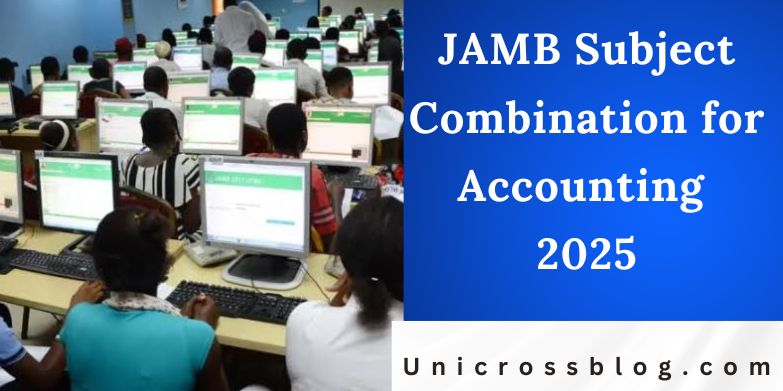Accounting is one of the most sought-after courses in Nigeria due to its relevance in various sectors, including banking, auditing, taxation, management, and consulting. It involves recording, analyzing, and reporting financial transactions, making it a critical discipline for businesses and organizations.
For students aspiring to study Accounting in Nigerian universities, selecting the correct subject combination for the Joint Admissions and Matriculation Board (JAMB) Unified Tertiary Matriculation Examination (UTME) is crucial. Choosing the wrong subjects can jeopardize admission chances, even with a high JAMB score.

JAMB Subject Combination for Accounting
To study Accounting in any Nigerian university, candidates must register for and sit for the JAMB UTME, which tests knowledge in four subjects. The required JAMB subject combination for Accounting is:
-
Use of English (Compulsory for all courses)
-
Mathematics (Essential for calculations and data analysis in accounting)
-
Economics (Provides foundational knowledge of financial principles and market trends)
-
Any other Social Science subject (Options include Commerce, Government, Geography, or Principles of Accounts)
Notes on Subject Selection
-
English Language is mandatory for all JAMB candidates, as it tests communication skills vital for accounting professionals.
-
Mathematics is critical due to the numerical and analytical demands of accounting.
-
Economics is compulsory in most universities, as it equips students with an understanding of economic principles relevant to financial management.
-
The fourth subject should be a Social Science subject. Commerce or Principles of Accounts are often preferred, as they align closely with accounting. However, some universities accept Government or Geography. Always check the specific requirements of your chosen university, as preferences may vary.
O’Level Requirements for Accounting
In addition to the JAMB subject combination, candidates must meet the O’level requirements, typically obtained through examinations like the West African Senior School Certificate Examination (WASSCE), National Examination Council (NECO), or equivalent. The general O’level requirements for Accounting are:
-
Five (5) SSCE credit passes in the following subjects:
-
English Language
-
Mathematics
-
Economics
-
Any two other relevant subjects (e.g., Principles of Accounts, Commerce, Government, Geography, or Business Studies)
-
Special Considerations
-
Some universities, such as the University of Lagos (UNILAG), may require credit passes in Financial Accounting or Principles of Accounts.
-
For candidates with a National Business Certificate (NBC), the two additional subjects can include Principles of Accounts, Commerce, Office Practice, or Secretarial Duties.
-
Certain institutions, like Ahmadu Bello University (ABU), may accept specific combinations, such as Economics and Financial Accounting, alongside other management or social science subjects.
-
Candidates should verify the specific O’level requirements of their preferred university, as some may have unique conditions.
Direct Entry Requirements
For candidates applying through Direct Entry (DE), the requirements typically include:
-
Two (2) A’Level passes in Economics and one other subject (e.g., Accounting, Business Management, Government, or Geography).
-
National Diploma (ND) or Higher National Diploma (HND) in Accounting, Banking and Finance, or Business Management with at least a lower credit.
-
NCE with a merit pass in a relevant field.
-
Intermediate ICAN or equivalent professional qualifications may be accepted by some universities like Abia State University (ABSU).
Candidates must also meet the O’level requirements mentioned above. Universities like the University of Nigeria, Nsukka (UNN), and Covenant University may have additional criteria, so checking the JAMB brochure or the institution’s website is advisable.
Universities Offering Accounting in Nigeria
Many Nigerian universities offer Accounting under the Faculty of Administration or Social and Management Sciences. Some reputable institutions include:
-
University of Lagos (UNILAG)
-
University of Ibadan (UI)
-
Ahmadu Bello University (ABU), Zaria
-
University of Nigeria, Nsukka (UNN)
-
Obafemi Awolowo University (OAU), Ile-Ife
-
Covenant University, Ota
-
University of Benin (UNIBEN)
-
University of Ilorin (UNILORIN)
-
Afe Babalola University (ABUAD)
-
Niger Delta University (NDU)
Each university may have specific admission criteria, such as higher cut-off marks or additional post-UTME requirements. A minimum JAMB score of 180 is generally required, but competitive institutions often demand scores of 200 or above.
Tips for Choosing the Right Subject Combination
-
Confirm University Requirements: Check the JAMB brochure or the university’s official website for specific subject preferences or waivers.
-
Prioritize Relevant Subjects: Opt for Commerce or Principles of Accounts as the fourth subject to strengthen your application.
-
Avoid Irrelevant Subjects: Subjects like Biology, Physics, or Literature are not typically accepted for Accounting.
-
Prepare Adequately: Use the JAMB syllabus for Principles of Accounts, Mathematics, Economics, and English to guide your preparation.
-
Check Cut-Off Marks: Ensure your JAMB score meets or exceeds the cut-off mark of your chosen institution.
Career Prospects for Accounting Graduates
Graduates with a degree in Accounting have diverse career opportunities in Nigeria and beyond. Potential roles include:
-
Accountant in corporate organizations or accounting firms
-
Auditor at firms like PwC, KPMG, or Deloitte
-
Financial Analyst in banking or financial services
-
Tax Consultant in taxation agencies
-
Entrepreneur managing personal businesses
-
Management Consultant in strategic business advisory
Obtaining professional certifications like ICAN (Institute of Chartered Accountants of Nigeria) or ACCA (Association of Chartered Certified Accountants) can further enhance career prospects.
READ ALSO: Approved JAMB Subject Combination for Medicine and Surgery 2025
FAQs
Can I study Accounting without Economics in JAMB?
No, Economics is a compulsory subject for Accounting in most Nigerian universities. It provides essential knowledge of financial systems and market trends.
Is Commerce compulsory for Accounting in JAMB?
Commerce is not compulsory but is highly recommended as the fourth subject, as it aligns closely with accounting principles. Other acceptable subjects include Government or Geography, depending on the university.
Can I use Biology as a Social Science subject for Accounting?
No, Biology is a Science subject and not acceptable as a Social Science subject for Accounting. Choose subjects like Commerce, Government, or Geography instead.
What is the minimum JAMB score to study Accounting?
The general minimum score is 180, but competitive universities like UNILAG, UI, or Covenant University may require scores of 200 or higher.
Can I study Accounting without Accounting in my O’level results?
Yes, you can study Accounting without Accounting in your O’level results, provided you have credits in English Language, Mathematics, Economics, and two other relevant subjects. However, some universities, like UNILAG, may prefer candidates with Principles of Accounts.
What is the duration of an Accounting degree in Nigeria?
An Accounting degree typically takes four years for UTME candidates and three years for Direct Entry candidates, depending on the university’s academic calendar.
Can I combine Accounting with other courses like Business Administration?
Yes, some universities allow combinations with related fields like Business Administration or Finance, but you must meet the specific subject requirements for each program.
What happens if I choose the wrong JAMB subject combination?
Choosing the wrong subject combination may lead to disqualification, even if you score high in JAMB. You can apply for a JAMB change of subject combination before the examination, if allowed.







